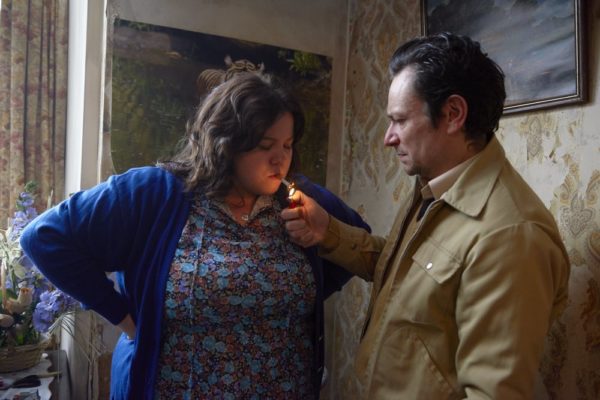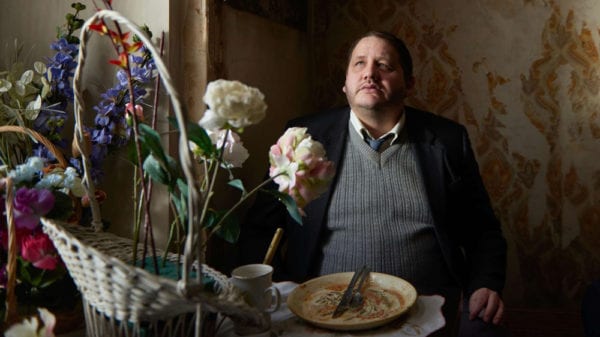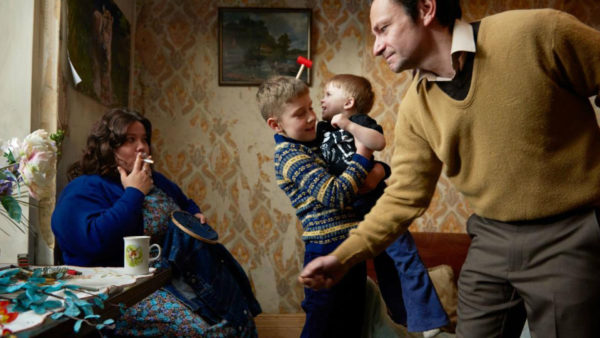Ray & Liz, 2018.
Written and directed by Richard Billingham.
Starring Ella Smith, Justin Sallinger, Patrick Romer, Tony Way, Sam Gittins, Joshua Millard-Lloyd and Deirdre Kelly.
SYNOPSIS:
A poverty-stricken family living in the Black Country during the 1980s struggles with the constant spectre of financial peril.
From the very first shots of photographer turned filmmaker Richard Billingham’s debut feature Ray & Liz, it’s clear this isn’t a rose-tinted take on working class Britain. The camera follows flies buzzing around the grubby home of the first half of the titular couple and we see snippets of his daily routine. It’s a sad existence that consists of pottering around one room, while swigging dodgy home-brewed beer from unlabelled plastic bottles.
This sad tableau becomes the framing device of a movie that predominantly focuses on two incidents from Billingham’s real childhood, told via flashback. The first sees he and toddler brother Jason left in the care of a hapless relative (Tony Way), who is tricked by the couple’s intimidating lodger (Sam Gittins) into downing most of Liz’s (Ella Smith) secret booze supply. When she and her husband (Justin Sallinger) return, all hell breaks loose. The second story recounts the time Jason (Joshua Millard-Lloyd), now aged 10, disappeared for several days around Bonfire Night.
There’s no doubting the straight-faced verisimilitude of Billingham’s filmmaking, with the tobacco-stained walls and grotesque alcoholic beverages being a hallmark of the critically acclaimed photographic works from which the film is inspired. Billingham’s camera rams itself into the claustrophobic living rooms and hallways of the Midlands in the Thatcher era, creating a pervasive atmosphere of grim desperation. You can almost smell the fag smoke.
The central performance, too, is fierce and committed. Ella Smith as the brash, crude matriarch of the family is absolutely the standout – a force of nature at the centre of a film that’s often a little too willing to sit in silence. From the moment we meet Tony Way’s timid Uncle Lol, it’s clear he is every bit as terrified of Liz as he is of the thuggish lodger who eventually becomes his undoing. Smith keeps the movie afloat with a performance that feels as real as it does outlandish. It’s fitting when Benefits Street star Deirdre “White Dee” Kelly turns up as an older version of Liz, as she feels like the modern analogue of Smith’s character.
Unfortunately, the rest of Ray & Liz can’t match up to the twin pillars of its setting and its central performance. Given the potential of this world and the strength of Smith’s work, it’s shocking that Billingham – making his feature debut – is so willing to devote his running time to dramatically inert and over-extended scenes that are closer to photographs than they are to cinematic moments. The film is far stronger when it’s observing the sadness of the couple’s stash of cigarette butts found under a subway – “there’s an inch of white left on some of those” – than it is when it tries to cast a more artful eye on the environment in which this family lives.
As much as Ray & Liz delivers when it comes to portraying the milieu of Billingham’s childhood, in the same way as his famous photographs did, it doesn’t quite reach the heights it should as a movie. Ella Smith dominates proceedings with a very strong performance, but the sparse narrative and fairly lacklustre supporting cast is on far shakier ground.
Flickering Myth Rating – Film: ★ ★ ★ / Movie: ★ ★
Tom Beasley is a freelance film journalist and wrestling fan. Follow him on Twitter via @TomJBeasley for movie opinions, wrestling stuff and puns.













